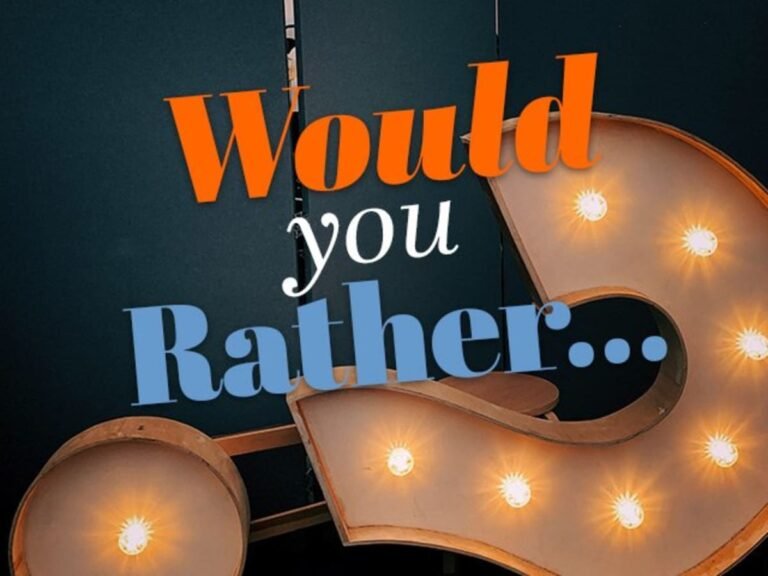Would You Rather questions have long been a popular form of entertainment and icebreaker, challenging participants to make difficult choices between two equally compelling or absurd options. From hypothetical scenarios to moral dilemmas, Would You Rather questions spark lively debates, reveal insights into personality, and provide hours of amusement. In this article, we’ll delve into the world of Would You Rather questions, exploring their origins, appeal, and some of the most intriguing examples to ponder.
Origins and Evolution:
The origins of Would You Rather questions are difficult to pinpoint, as they have likely been a part of human culture for centuries, passed down through generations as a form of oral tradition and amusement. However, the modern incarnation of Would You Rather questions can be traced back to the parlor games and conversation starters popularized in the 20th century. Over time, Would You Rather questions have evolved and adapted to reflect changing cultural norms and societal trends, encompassing a wide range of topics and scenarios to suit every taste and preference.
The Appeal of Would You Rather Questions:
What makes Would You Rather questions so appealing? Part of their allure lies in their simplicity and universality—anyone can participate in a game of Would You Rather, regardless of age, background, or interests. They also provide a fun and lighthearted way to get to know others, fostering conversation and connection in social settings. Additionally, Would You Rather questions tap into our innate curiosity and imagination, challenging us to consider hypothetical scenarios and explore the depths of our own preferences and values.
Types of Would You Rather Questions:
Would You Rather questions come in many forms, ranging from silly and whimsical to thought-provoking and philosophical. Some common types of Would You Rather questions include:
- Situational Dilemmas: These questions present participants with two hypothetical scenarios and ask them to choose which they would rather experience. For example, “Would you rather be able to fly or be invisible?”
- Moral and Ethical Choices: These questions pose moral dilemmas and ask participants to weigh the consequences of their choices. For example, “Would you rather save one person you love or five strangers?”
- Preference-Based Queries: These questions explore personal preferences and tastes, asking participants to choose between two options based on their likes and dislikes. For example, “Would you rather eat pizza for every meal or never eat pizza again?”
The Psychology Behind Would You Rather Questions:
Would You Rather questions provide more than just entertainment—they also offer insights into human psychology and decision-making. Research has shown that the choices people make in response to Would You Rather questions can reveal underlying preferences, values, and personality traits. For example, someone who chooses adventure over security in a hypothetical scenario may value excitement and novelty in their real-life experiences. Additionally, Would You Rather questions can stimulate critical thinking and decision-making skills, as participants weigh the pros and cons of each option and consider the implications of their choices.
Examples of Would You Rather Questions:
To give you a taste of the variety and creativity found in Would You Rather questions, here are a few examples to ponder:
- Would you rather have the ability to time travel to the past or the future?
- Would you rather be able to speak all languages fluently or play all musical instruments proficiently?
- Would you rather live in a world without the internet or without television?
- Would you rather have the power of flight or the power of telekinesis?
- Would you rather have unlimited money or unlimited happiness?
Playing Would You Rather: Tips and Strategies:
Whether you’re playing Would You Rather with friends, family, or strangers, here are some tips and strategies for maximizing the fun:
- Encourage creativity and imagination by coming up with your own Would You Rather questions.
- Respect others’ choices and avoid judging or criticizing their responses.
- Use Would You Rather questions as a springboard for deeper conversations and discussions about values, preferences, and life experiences.
- Have fun and don’t take the game too seriously—after all, it’s all about enjoying the journey and exploring the possibilities.
Conclusion:
In conclusion, Would You Rather questions offer a fun and engaging way to spark conversation, stimulate the imagination, and explore the depths of human psychology. Whether you’re pondering hypothetical scenarios, weighing moral dilemmas, or simply expressing your preferences, Would You Rather questions provide endless opportunities for amusement and insight. So the next time you’re looking for a fun game to play with friends or a thought-provoking conversation starter, why not dive into the world of Would You Rather questions and see where your imagination takes you?

